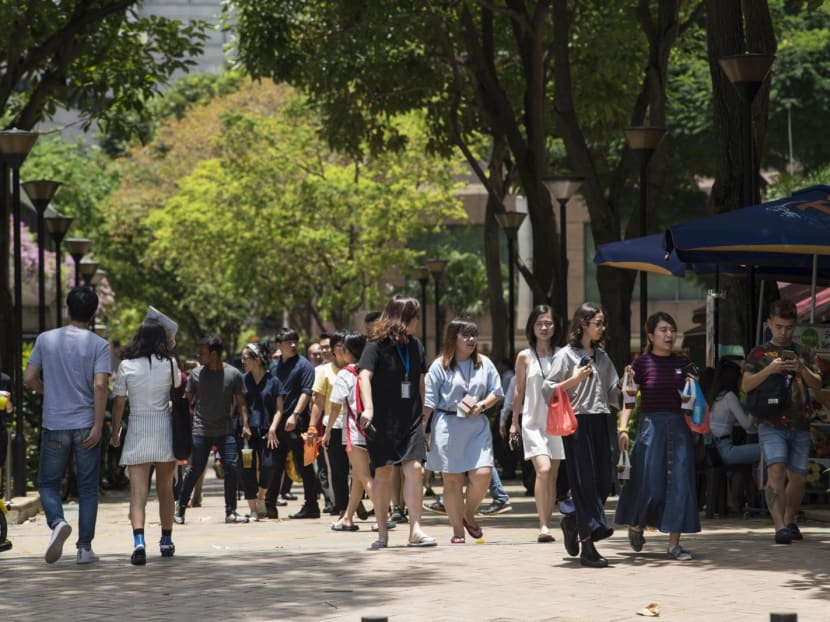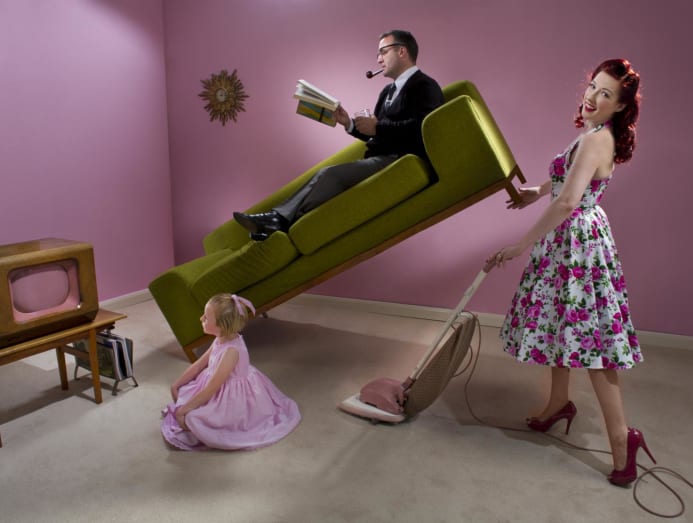Women in Singapore have much to celebrate - but having choices doesn’t remove challenges
Following the “man or bear” trend in the United States to a Kansas City Chiefs player’s regressive convocation speech has made CNA Lifestyle’s Grace Yeoh glad to live in Singapore. But women here are not immune to similar entrenched gendered beliefs that underpin the issues happening abroad.

Protective and empowering legislation, along with individual autonomy, ring hollow if we remain guided by entrenched gender stereotypes – about both men and women. (Photo: iStock/3yephotography)

This audio is generated by an AI tool.
When I was a young girl, I was taught about choice – or the illusion of it. My grandfather had come across a particular printed cartoon of a factory production line and quickly became obsessed with its messaging. He made several copies for me and my cousins, seizing any chance to educate us on what he’d gleaned from the cartoon.
This was no ordinary factory. The conveyor belt carried humans, who were sorted into different boxes, each representing different career paths. Humans wearing a mortarboard landed in the doctor and lawyer boxes – and looked suspiciously happy – while those without a mortarboard ended up being grumpy road sweepers.
The lesson was simple, according to my grandfather’s repeated drilling: If I studied hard, I would end up successful and happy, with a well-paying job, which would then help me find a good husband and start a nice family. And didn’t I want to be successful and happy?
But, of course, I could only pick from select paths, which I was supposed to desire.
As much as my grandfather probably thought he was being progressive by foisting upon me careers that girls wouldn’t have been encouraged to pursue during his time, I only internalised one thing: My choices were wrong if it didn’t align with his.
A WOMAN’S VOCATION AS “HOMEMAKER”?
Over the next two decades, I would suppress the same frustration whenever I was fed the message that a specific kind of life would bring me success and happiness. But having now become comfortable with my own choices in my thirties, I’d built an unapologetic life where another woman’s choices don’t feel like an indictment of my own.
I’d assumed I was already desensitised to anyone’s opposing beliefs.

I was wrong. The unresolved triggers from my youth resurfaced earlier in May when I read that Harrison Butker, an NFL kicker for the US Kansas City Chiefs, which Taylor Swift’s boyfriend Travis Kelce also plays for, had urged women to embrace the vocation of “homemaker”. It was “one of the most important titles of all”, he’d said in a convocation speech that has since been heavily rebuked.
Butker’s speech evoked a familiar frustration in me, though not because I believe women should be more than homemakers. Rather, it’s because his remarks, like my grandfather’s, implied that women who make certain life choices – and only those kinds of life choices – are more worthy, better off or have fulfilled their purpose, unlike those who don’t.
Butker’s beliefs are also hard to stomach because they represent a deep, seemingly growing, social and religious conservatism in the US that seeks to restrict women’s decisions over their health and bodies. Following the June 2022 overturn of Roe v Wade by the US Supreme Court, a landmark ruling in 1973 which recognised a woman’s constitutional right to an abortion and legalised it nationwide, 14 states have made abortion illegal.
Even though abortion laws in Singapore are considered relatively progressive with the procedure allowed up to 24 weeks into pregnancy, it’s no secret that our values are influenced by our consumption habits, the majority of which are steeped in Western culture.

CHOICES EXIST – AND SO DO CHALLENGES
Still, as a millennial born and bred in Singapore, choice – and I mean real choice – appears to be the crux of women’s development here. Against the backdrop of whatever’s happening to women’s rights in the US, we have much to celebrate.
For one, we generally don’t have faith-based national policies about our body and health forced upon us. Neither do we have to fight tooth and nail to get an education or a job solely due to gender discrimination.
Greater support for fathers also benefits mothers, with the government and some private firms actively ramping up paternity leave. Plus, with an upcoming key amendment to the civil divorce process that allows couples to divorce by mutual agreement, there is perhaps less fear that anyone will be stuck in an unhappy marriage for life due to legislation or lack thereof.
On the personal front, I too have achieved much without facing much gender discrimination, although perhaps I’ve just been wilfully oblivious, thanks to an inborn rebellious streak that often drives me to proceed full throttle despite the odds. I suspect my headstrong character and lack of qualm when it comes to calling out unsavoury behaviour has inadvertently shielded me from being on the receiving end of blatantly discriminatory practices.
That said, I am aware the availability of empowering options doesn’t erase the inherent challenges of being a woman.
The recent “man or bear” trend – which poses the hypothetical question to women about whether they would rather be trapped in the woods with a male stranger or a bear – has sparked numerous conversations about violence against women and the lack of safety females feel around men.
For some women who spoke to CNA Women, the question isn’t really asking for personal preference. Instead, it’s meant to highlight that many women have had enough unsafe experiences with men that they would rather choose the possibility of being eaten by a bear.
Personally, before I started solo travelling and couchsurfing with strangers in my twenties, I took for granted my ability to leave home, whether at 2pm or 2am, knowing I’d be able to return in one piece. I never knew what extreme heightened vigilance felt like, until I was trapped with strange men in the confined spaces of planes and trains while abroad.
Theoretical conundrum aside, real challenges – like the gender pay gap – continue to persist. While the adjusted gender pay gap for 2023 stood at six per cent, down from the unadjusted median gender pay gap of 14.3 per cent, the smaller figure doesn’t measure characteristics like the effects of parenthood and caregiving responsibilities, which women tend to shoulder more than men.
While the fight for zero gender pay gap is important, I’ve not let the absence of pay parity stand in the way of building my F-Off fund – a semi-emergency stash that I feel is especially crucial for women to prevent us from staying in any job, relationship or house due to a traditional mindset of financial dependence on others.
But protective and empowering legislation, along with individual autonomy, ring hollow if we remain guided by entrenched gender stereotypes – about both men and women.
A LIMIT TO CHOICE
Admittedly, I have my own deep-seated beliefs and expectations about fellow women. I’ve always believed choice is at the heart of feminism, yet I struggle to accept choices by women that uphold outdated gender roles.
Not long ago, I came across the tradwife (short for “traditional wife”) social media phenomenon and felt put off. Tradwife influencers showcase a life usually built around 1950s American culture, Christian religious values and conservative politics.
Estee Williams, one of the more popular creators in the tradwife subculture, explained in a video that a tradwife is a woman who chooses to subscribe to “ultra traditional gender roles”. The man goes to work and provides for the family, while the woman is the homemaker.
“Tradwives also believe that they should submit to their husbands, and serve their husbands and family. And that triggers people because the words submit and serve… make women think that we’re saying that we’re less than a man,” she said. “That’s not what we’re saying; tradwives just believe that they are here as women for a different role. Equally as important, though.”
Williams concludes that women should have the choice to be homemakers or not without being judged or shunned.
I accept that not everyone shares the same values. Yet I confess: I couldn’t accept that I, pro-choice in every way, couldn’t accept her choice.
But perhaps my abhorrence for the tradwife is no different from my grandfather’s disapproval for any life path that strays from conventionally successful careers and happy families, nor from the disbelief – largely by men – that many women would pick a bear over a man. Another woman’s choice is only acceptable when it aligns with ours.
Just like it’s easier to say you believe in feminism than to be a feminist, it would be convenient to distance ourselves from whatever’s happening in the US to women’s health and bodies, convincing ourselves we have it much better in Singapore and that online trends won’t permeate offline behaviour.
It’s harder to accept that our understanding of women’s issues in general does reflect the state of a society – and that to begin realising how these issues affect us, sometimes the first place to look is in the mirror.
CNA Women is a section on CNA Lifestyle that seeks to inform, empower and inspire the modern woman. If you have women-related news, issues and ideas to share with us, email CNAWomen [at] mediacorp.com.sg (CNAWomen[at]mediacorp[dot]com[dot]sg).










